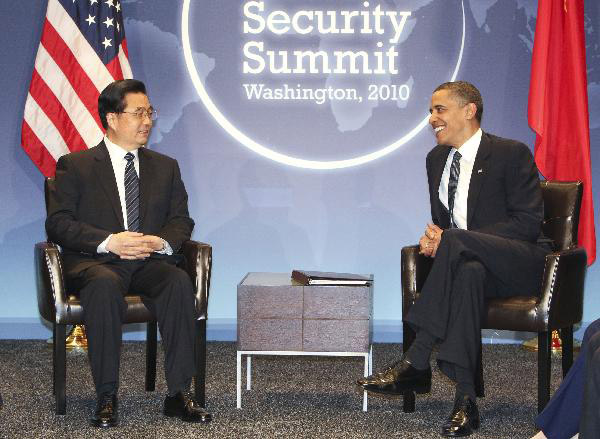China sets higher standard for nuclear security
The global summit on nuclear security opened yesterday in Washington DC. More than 40 countries and international organizations participate in this summit. Global Times (GT) reporter Peng Kuang interviewed Li Bin (Li Bin), a professor with the Institute of International Studies at Tsinghua University, Li Qinggong (Li), deputy secretary-general of China Council for National Security Policy Studies, and Niu Li (Niu), a professor with the PLA Academy of Communications, on nuclear security and its impact on China.
 |
|
Chinese President Hu Jintao (L) meets with U.S. President Barack Obama in Washington April 12, 2010. President Hu Jintao arrived in Washington on Monday to attend the Nuclear Security Summit slated for April 12-13. [Ju Peng/Xinhua] |
GT: What are the major issues on the agenda of the global summit on nuclear security?
Li Bin: The concept of "nuclear security" needs to be clarified first.
The Nuclear Security Summit, according to U.S. President Barack Obama's plan, will discuss the protection of nuclear weapons and nuclear materials. The main topic is to avoid terrorists getting their hands on the materials.
In some civil nuclear facilities, the highly concentrated uranium used for reactors can be used to build nuclear weapons directly. So the safety of these materials needs to be emphasized. In the documents of the International Atomic Energy Agency, nuclear security is also addressed in the same way.
A common misunderstanding of "nuclear security" regards it as threats to national security. Lots of international organizations talk about nuclear security under this (mis)understanding. But this summit will not be talking about these issues.
Another misunderstanding is mixing up "nuclear security" and "nuclear safety." "Nuclear safety" is tackling the accidents caused by nuclear activities, such as dealing with the aftermath of the Chernobyl incident in Ukraine.
 0
0 







Go to Forum >>0 Comments